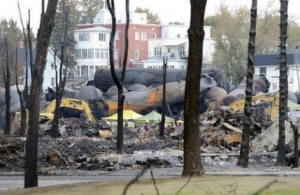|

Victims of Quebec
oil-by-rail disaster agree to $200 million settlement
 Send a link to a friend
Send a link to a friend
[January 10, 2015]
By Julie Gordon
(Reuters) - Victims of the Lac-Megantic
oil-by-rail disaster that killed 47 people in the Canadian province of
Quebec in 2013 agreed to a nearly $200 million settlement with some of
the firms involved, including the insolvent rail operator at the center
of the tragedy, a lawyer for the victims said on Friday.
|
|
 Montreal Maine and Atlantic (MMA), along with its insurers, founder
Edward Burkhardt, and various other companies, will pay into the
settlement fund, which will be distributed to the victims of the
train derailment and explosion, lawyer Peter Flowers of Meyers &
Flowers in Chicago told Reuters. Montreal Maine and Atlantic (MMA), along with its insurers, founder
Edward Burkhardt, and various other companies, will pay into the
settlement fund, which will be distributed to the victims of the
train derailment and explosion, lawyer Peter Flowers of Meyers &
Flowers in Chicago told Reuters.
A draft plan of the arrangement was filed in the Quebec Superior
Court on Friday as part of MMA's bankruptcy proceedings in Canada
and a similar plan will also be filed in a U.S. court. The
settlement is subject to approval by the courts.
Once approved, the funds will be split between the wrongful death
claimants, including the victims and their families, along with
personal injury claimants, property damage and economic claimants,
insurers, and provincial and federal governments.

"This is a good first step to bring some form of justice to these
people who have gone through hell and back," said Flowers.
"Hopefully this helps in some way so these people can figure out the
rest of their lives."
Flowers added that the settlement was just the "tip of the iceberg,"
and said he will continue to pursue claims against other companies
linked to the disaster including World Fuel Services <INT.N>,
Canadian Pacific Railway <CP.TO> and privately-held Irving Oil.
[to top of second column] |

The tank cars that derailed and exploded with surprising force in
Lac-Megantic in July 2013 were transporting oil from the Bakken
energy fields in North Dakota to an Irving refinery in Eastern
Canada.
World Fuel Services, which arranged the delivery, has argued in
court filings that the rail disaster was chiefly a human error and
nothing in the labeling, or packaging could have changed the
outcome.
(Reporting by Julie Gordon in Vancouver, David Ljunggren and Randall
Palmer in Ottawa, editing by G Crosse and Bernard Orr)
[© 2014 Thomson Reuters. All rights
reserved.] Copyright 2014 Reuters. All rights reserved. This material may not be published,
broadcast, rewritten or redistributed.
 |